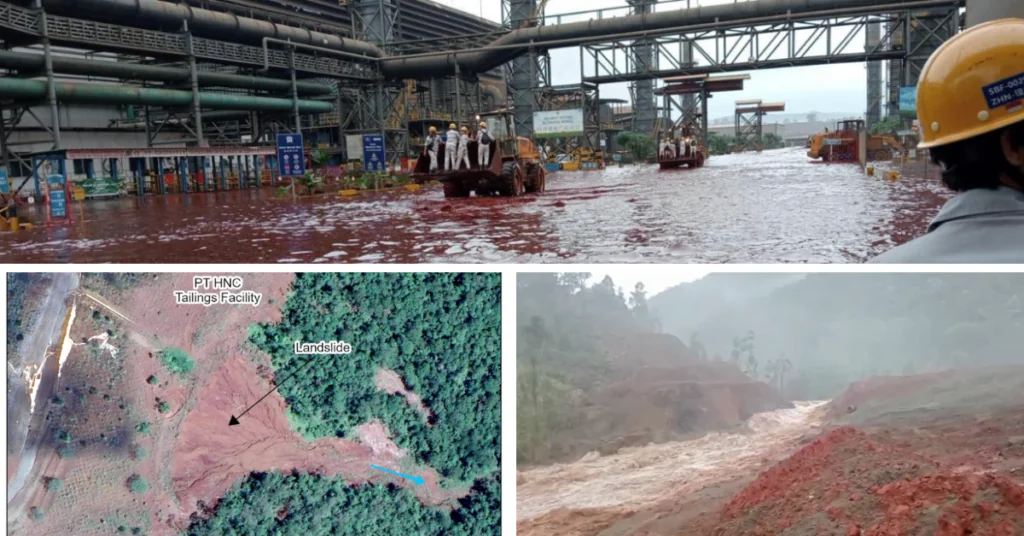|
Getting your Trinity Audio player ready...
|
Three people are feared dead and hundreds more are at risk of negative health impacts after multiple tailings dams, which store toxic mine waste, collapsed inside an industrial park in Indonesia.
According to media and worker testimony, on March 16, the PT Huayue Nickel Cobalt tailings storage facility was breached, and liquified tailings flowed into the Bahadopi River. The breach flooded facilities at the Indonesia Morowali Industrial Park (IMIP) .
On March 21, another tailings facility inside IMIP, owned by PT Qing Mei Bang (QMB) New Energy Materials, collapsed, killing three workers. According to testimony from workers represented by SPIM-KPBI, the second largest union at IMIP, the tailings facility was constructed on top of an infilled pond, a highly questionable practice that likely resulted in a high water table within the facility. Photos taken at the site of rescue efforts show a pond where the body of one of the workers was found. The PT QMB tailings facility that collapsed is located right next to the PT HNC tailings facility, at a location locally known as KM8. It is unclear if these two facilities actually operate as one.

The PT QMB facility reportedly experienced an additional incident this week that put the safety of workers at risk. On March 27, videos shared by workers showed a landslide at the PT QMB ore stockpile inside IMIP.
The problems may predate this month’s disasters. Google Earth imagery from January 2025 shows a landslide from the filtered tailings storage facility inside the Indonesia Morowali Industrial Park (IMIP) operated by PT Huayue Nickel Cobalt (HNC). This appears to show that at least one collapse of the PT HNC tailings facility occurred even before the heavy rains of March 2025 that caused multiple tailings dam failures at IMIP.
The Independent Land Foundation (Yayasan Tanah Merdeka – YTM), based in Central Sulawesi, released a press statement calling the failings storage at IMIP “very risky and dangerous in areas with high rainfall rates such as Morowali.” YTM highlights the high rates of deforestation due to nickel mining as a compounding factor.
The affected tailings facilities are storing waste from High Pressure Acid Leach (HPAL), a processing technology that converts low-grade nickel ore to produce mixed hydroxide precipitate, a key component for lithium-ion batteries, which are commonly used in electric vehicles, electronics, energy storage, and military applications. HPAL generates large amounts of highly corrosive and toxic tailings. It is estimated that for every ton of nickel, HPAL processing makes 150-200 tons of tailings.
The affected facilities all claim to use filtered tailings. This means that some of the water is removed from the tailings before placing them in a dam. Filtered tailings can be a safer method of storing mine waste, but as evidenced by the tragedies at IMIP, heavy rains can dramatically increase their risks. Seismic activity is another factor that increases the risks associated with tailings. The IMIP is located on the Matano Fault, which is an active fault and part of the Central Sulawesi Fault System (CSFS), alongside the Palu-Koro Fault. Strong earthquakes have repeatedly struck Morowali in recent years.
Initially, companies developing HPAL projects at IMIP planned to dispose of the toxic tailings into the ocean. However, the government of Indonesia announced that it would not issue permits for the outdated and harmful practice. Companies at IMIP, Harita Nickel’s Obi Island operation and the Indonesia Weda Bay Industrial Park (IWIP), shifted to instead store the waste on land at filtered tailings facilities. The series of filtered tailings breaches at IMIP in March point to a dangerous situation that will only get worse as mining operations across Indonesia are creating, or planning to create, hundreds of millions of tons of highly toxic and hazardous filtered tailings from HPAL.
YTM is calling on the government to review the licensing of the tailings storage facilities at IMIP given the threat that they pose to the safety of residents, workers, and the natural environment. It is also demanding an evaluation of the Occupational Health and Safety (OHS) standards at IMIP that have led to repeated workplace accidents. YTM is demanding accountability for the unsafe conditions at the tailings facilities and for full transparency and disclosure about the failures and flooding from the companies responsible.
This blog has been edited to remove a reference to floods that affected a nearby village and their associated risks.
